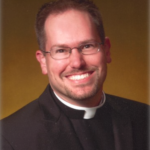2/10/2023
The Gospel of Matthew: Still Too Radical a Vision?
 Rich Andre, CSP
Rich Andre, CSP
February 10, 2023
 Rich Andre, CSP
Rich Andre, CSP
February 10, 2023
The Gospel of Matthew shares 80% of its material with the Gospels of Mark and/or Luke. Nevertheless, it still holds a place of privilege in Christianity, laying out Jesus’ teachings in the most systematic fashion of the 4 gospels. Matthew presents Jesus as the new Moses, proclaiming his teachings over 5 discourses. It is no coincidence that Jesus gives the first of these discourses on a mountaintop, just as Moses received the 5 books of the Law from God on Mt. Sinai.
In Matthew, both Jesus’ life and his teachings explain “the kingdom of heaven” breaking into the world in this new and final age of humanity. This kingdom is ushered in especially through Jesus’ passion, death, and resurrection, but it has been foreshadowed by all that has come before it. The stunningly powerful Sermon on the Mount is Jesus’ programmatic address detailing the precepts of that kingdom.
Matthew contrasts this realm with “the kingdom of Satan,” led by the scribes and Pharisees who plot to kill Jesus. The dramatic turning point occurs at 12:22-27, after which the disciples form a community separate from those who oppose Jesus. Such a conflict would have resonated with Matthew’s audience, whom we believe were the Jewish Christians of Antioch in the 70s and 80s. These believers felt rejected by the growing Greek Christian majority because they were Jewish, and rejected by their fellow Jews because they were Christian.
But even with such conflict, Matthew’s Jesus makes it clear that it is not the place of believers to decide who belongs to which kingdom. Matthew repeatedly includes admonitions not to judge and exhortations to reconcile. It makes me think about Kurt Vonnegut’s lamentation in A Man Without a Country. Many Christians have fought long and hard for the Ten Commandments to be posted in government buildings – harsh statements about what not to do. Yet few people have advocated for posting the Beatitudes, which speak instead of the values more central to the kingdom of heaven. Just imagine, as Vonnegut did, if we posted “Blessed are the merciful” in courtrooms and “Blessed are the peacemakers” in the Pentagon!
Perhaps a lot of us are uncomfortable identifying too closely with a kingdom outlined by Matthew 5-7. Two weeks ago, I led a group of Paulist pilgrims to a place in Galilee commemorating Jesus giving the Sermon on the Mount. Ironically, even though the Beatitudes (Matthew 5:3-12) are posted many times on the property, in multiple languages, there are no plaques commemorating any of the remaining 97 verses of the Sermon on the Mount.
Even now, the kingdom of heaven is not fully realized. But as scripture scholar Arland J. Hultgren wrote, “As the dawn precedes the rising of the sun… its effects can be seen as lighting up the present.” While we await the kingdom of heaven, we must endeavor to treat every person with the love, humility, mercy, and forgiveness of Jesus (5:3-12; 9:35-38; 11:28-30; 20:26-30), making disciples of all nations (28:19).